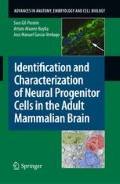Stem cell therapy has become a promising prospect in the treatment of degenerative diseases of different body organs and systems. In this context, both embryonic stem cells and adult stem cells have been considered for transplants in these cell-based therapies (Jordan et al. 2006). The cellular behavior of NSCs (or neural progenitors) has allowed us to keep them in culture, and to amplify their number after serial passages. This implies that adult NSCs may be an important source of cells for transplants.
Access this chapter
Tax calculation will be finalised at checkout
Purchases are for personal use only
Author information
Authors and Affiliations
Corresponding author
Rights and permissions
Copyright information
© 2009 Springer-Verlag Berlin Heidelberg
About this chapter
Cite this chapter
Gil-Perotín, S., García-Verdugo, J.M., Álvarez-Buylla, A. (2009). Therapeutic Potential of Neural Stem Cells. In: Identification and Characterization of Neural Progenitor Cells in the Adult Mammalian Brain. Advances in Anatomy, Embryology and Cell Biology, vol 203. Springer, Berlin, Heidelberg. https://doi.org/10.1007/978-3-540-88719-5_6
Download citation
DOI: https://doi.org/10.1007/978-3-540-88719-5_6
Published:
Publisher Name: Springer, Berlin, Heidelberg
Print ISBN: 978-3-540-88718-8
Online ISBN: 978-3-540-88719-5
eBook Packages: Biomedical and Life SciencesBiomedical and Life Sciences (R0)

